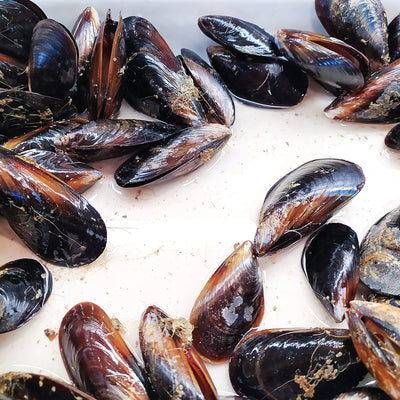Clams vs. Mussels: Exploring the Differences and Benefits

Clams vs. Mussels: The Ultimate Showdown of Flavor & Nutrition
"The ocean holds countless treasures, but few are as delicious and versatile as clams and mussels. Whether you're savoring a steaming bowl of buttery garlic mussels or enjoying the delicate sweetness of fresh clams, these shellfish bring the pure essence of the sea to your plate!"
But how do clams and mussels compare? Which one is healthier? And which is best for your next seafood feast?
Let’s dive deep into their flavors, textures, health benefits, and best cooking methods so you can decide which shellfish reigns supreme!
💡 Want the freshest live seafood? Order premium shellfish here:
🌊 Live Clams – Sweet, Briny & Delicious
🌊 Fresh Mussels – Plump, Tender & Flavorful
🌊 Wild Geoduck – The Ultimate Seafood Experience
Clams: Sweet, Delicate, and Packed with Nutrients
Clams are a true ocean delicacy, known for their mild, slightly sweet flavor and tender texture. They thrive in both saltwater and freshwater, making them a favorite across many culinary traditions.
🔥 Popular Clam Dishes:
✔ New England Clam Chowder – Rich, creamy, and comforting.
✔ Linguine with Clam Sauce – A seafood pasta classic.
✔ Steamed Clams with Garlic Butter – Simple, elegant, and bursting with flavor.
Health Benefits of Clams:
✔ Protein-Packed – Helps build and repair muscles.
✔ Rich in Iron – Supports healthy blood circulation and boosts energy.
✔ Vitamin B12 Powerhouse – Essential for brain function and nerve health.
✔ Low in Fat & Calories – Perfect for a lean, nutrient-dense diet.
💡 Pair your clams with exotic seafood for the ultimate feast:
🌊 Gooseneck Barnacles – A Rare & Exquisite Ocean Delight
Mussels: Bold, Briny, and Loaded with Omega-3s
Mussels have a richer, brinier, slightly more intense flavor than clams, with a soft, plump, and juicy texture that absorbs sauces beautifully. These nutrient-dense bivalves are often served in aromatic broths, making them a staple in French, Spanish, and Mediterranean cuisine.
🔥 Popular Mussel Dishes:
✔ Moules Marinières – French-style mussels in a white wine and garlic broth.
✔ Spicy Tomato Mussels – A bold and fiery seafood dish.
✔ Paella – A Spanish masterpiece featuring saffron rice and mussels.
Health Benefits of Mussels:
✔ Omega-3 Rich – Supports heart health and brain function.
✔ High in Selenium – A powerful antioxidant that boosts immunity.
✔ Packed with Vitamin K – Essential for strong bones and blood clotting.
✔ Lower in Mercury – A safe and sustainable seafood choice.
💡 Want to elevate your seafood experience? Try this unique delicacy:
🌊 Live Geoduck – The King of Exotic Shellfish
Clams vs. Mussels: The Ultimate Side-by-Side Comparison
| Feature | Clams 🦪 | Mussels 🦐 |
|---|---|---|
| Flavor | Mild, slightly sweet | Bold, briny, rich |
| Texture | Tender, slightly chewy | Soft, plump, juicy |
| Nutritional Benefits | High in protein, iron, and B12 | Packed with omega-3s, selenium, and vitamin K |
| Calories | Lower in calories | Slightly higher but still very healthy |
| Popular Dishes | Clam chowder, linguine with clams, steamed clams | Moules marinières, paella, spicy tomato mussels |
💡 Can't decide? Why not try both? Explore our live seafood selection:
🌊 Shop Fresh Live Seafood – Delivered Straight to Your Door
FAQs – Everything You Need to Know About Clams & Mussels
Q1: Are clams and mussels good for a low-carb diet?
✔ Yes! Both clams and mussels are naturally low in carbohydrates, making them ideal for keto and low-carb diets.
Q2: Can I eat clams and mussels if I have a shellfish allergy?
✔ If you have a shellfish allergy, consult your doctor before consuming clams, mussels, or any other shellfish.
Q3: How should I store fresh clams and mussels before cooking?
✔ Store them in the refrigerator, in a breathable container (not sealed in plastic!).
✔ Discard any that have broken shells or do not close when tapped.
Conclusion – Which One Should You Choose?
"The beauty of seafood is that there’s no wrong choice. Whether you go for the mild, delicate sweetness of clams or the bold, rich brininess of mussels, you’re indulging in one of the ocean’s finest delicacies!"
✔ If you prefer a mild, slightly sweet taste with a delicate texture, choose clams.
✔ If you enjoy stronger, more robust seafood flavors, mussels are your best bet.
💡 Why settle for just one? Mix things up and create the ultimate seafood platter!
🌊 Order Live Clams – Sweet & Briny Perfection
🌊 Fresh Mussels – Buttery & Delicious
🌊 Rare Gooseneck Barnacles – A True Gourmet Delight
👉 Want to master seafood cooking? Watch expert chefs in action here:
🎥 Seafood Cooking Tutorials – Learn from the Best
Now, grab a steaming bowl of mussels in garlic butter or a creamy clam chowder, and let the flavors of the ocean take over your taste buds! 🦪🔥✨
Also in News

How to Make Sea Bream Sushi With Dry-Aged Tuna & Crab Roll — Step-by-Step With Chef Joshua
A complete guide to making Sea Bream sushi at home, including filleting, curing, slicing, and building a Dry-Aged Tuna & Crab sushi roll. Chef Joshua shares professional tips for restaurant-quality results.

Cooked Crab for Game Night: Everything You Need for a Perfect Seafood Party
Take your game night to the next level with a Cooked crab party. Learn the best recipes, cooking tips, and hosting hacks for a memorable seafood feast.

Steam Crab for Date Night: A Romantic Guide to the Perfect Seafood Feast
Make your next date night unforgettable with a romantic Steam crab experience. This guide covers everything you need to know, from ambiance to the best crab varieties.


